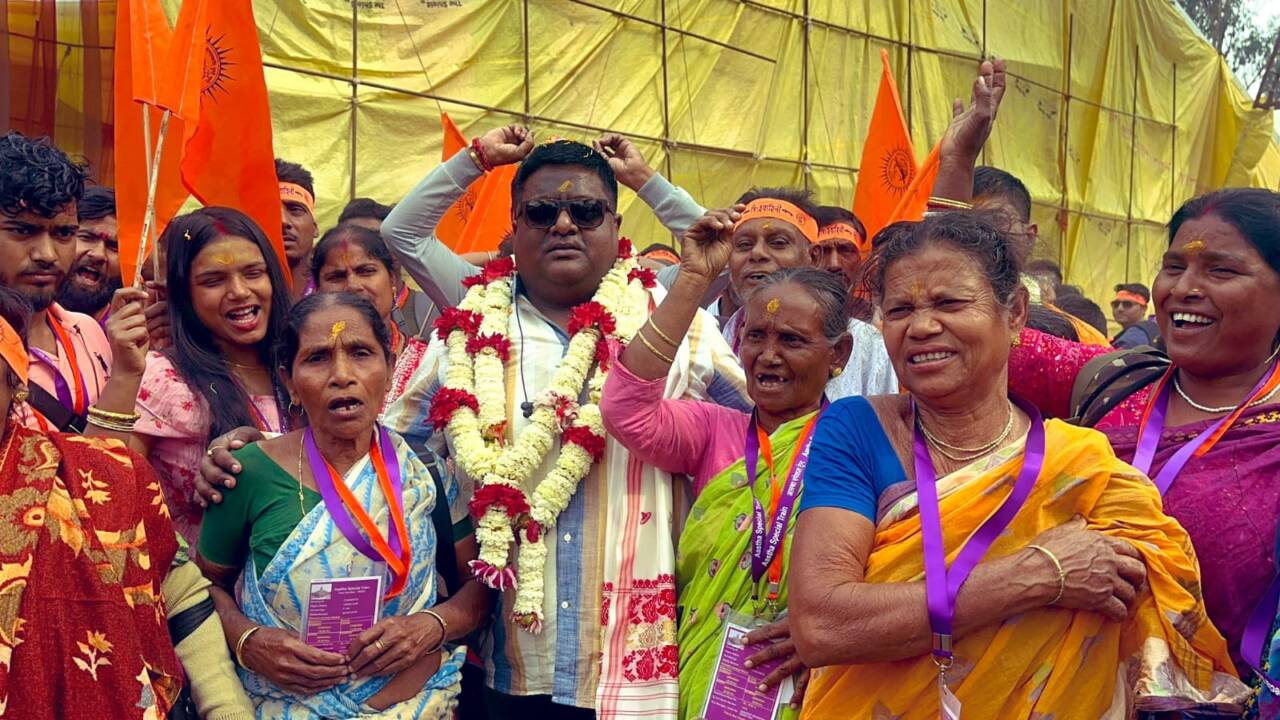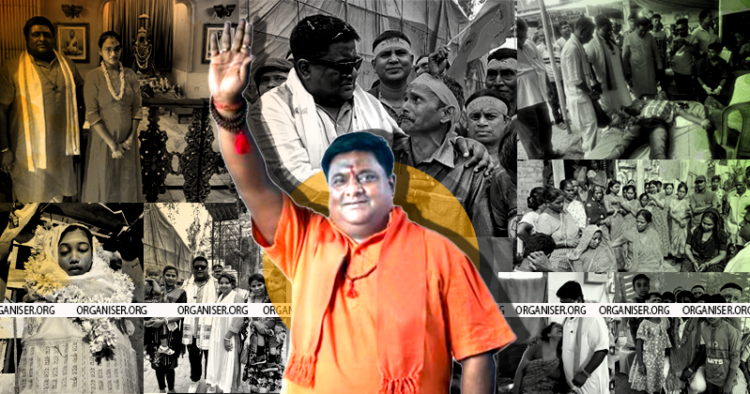In a remarkable pilgrimage, a group of recent converts from Islam to Sanatan Dharma travelled to Ayodhya to seek blessings from Ram Lalla at the newly consecrated Ram Mandir. The pilgrimage was organised by SinghaBahini, a Hindu advocacy group in Bengal. These devotees embarked on a spiritual journey from Kolkata to Ayodhya on February 28.
Led by SinghaBahini founder Devdutta Maji, over 300 devotees, including a dozen converts from Islam, participated in the sponsored pilgrimage. Among them were individuals rescued from ‘love jihad’ situations, finding solace and acceptance in their newfound faith.
Masjid to Mandir Yatra
This unique journey included recent convertees like Rajesh Dutta, formerly known as Jakiruddin, who underwent a profound transformation when he and his family embraced Hindu Dharma after years of yearning for the religion. With the support of SinghaBahini, Rajesh not only found solace in his newfound faith but also found love and companionship with Tumpa, who, like him, was a ‘love jihad’ victim.
Similarly, Rupa Das, previously named Shabnam Khatoon, sought refuge under the care of SinghaBahini activist Gopal Chandra Das. Embracing Hindu Dharma, Rupa not only found spiritual fulfilment but also played a pivotal role in resolving her mother’s legal troubles, which ultimately led to her family’s conversion. Brishti Haldar, formerly known as Salma Khatoon, escaped a forced marriage and discovered a sense of sanctuary in Sanatan Dharma. Now deeply devout, Brishti supports her husband in their shared aspirations for a floriculture farm.

Nusrat, formerly Pooja, broke free from familial pressure to marry and found happiness with her Hindu partner, Biswajit Sardar, with whom she now enjoys a peaceful life with their daughter. Shagufta, now called Mandira, turned to Hindu Dharma after experiencing persecution due to her love affair, and she now contributes to SinghaBahini’s efforts in rescuing distressed girls.
Finally, Tuktuki Mondal, who was abducted as a minor, found safety and purpose with SinghaBahini after two rescues. Her journey to Ayodhya served as a deeply transformative experience, symbolising her newfound spiritual and personal growth.
Echoing sentiments of spiritual fulfilment, these devotees expressed gratitude for the opportunity to visit Ayodhya. Their journey symbolises a personal and collective quest for peace and spiritual awakening.
Who is the man behind SinghaBahini?
In the turbulent landscape of West Bengal’s political arena, one figure stands out for his unwavering commitment to aiding persecuted Hindus and BJP workers amid the backdrop of escalating tensions and violence. Meet Devdutta Maji, a 44-year-old stalwart and president of SinghaBahini, a Hindutva outfit established in 2018.
Maji’s involvement spans various areas of assistance, including rescuing Hindu girls subjected to exploitation based on religion, facilitating the reconversion of Muslims and Christians to Sanatana Dharma, and advocating for persecuted Hindus not only in Bengal but across the nation. His proactive stance against the alleged violence perpetrated by Trinamool Congress goons has earned him recognition as a steadfast leader of the BJP.
Maji’s journey as a ‘Hindu warrior’ began with a harrowing incident in December 1992, during the aftermath of the Babri Masjid demolition. Witnessing the brutal killing of two Hindus fueled his resolve to combat injustices against his community. This incident ignited in him a resolve to combat injustices against Hindus, eventually leading him to join Hindu Samhati in 2009, where he actively participated in relief efforts during communal riots and supported victims of persecution.
Maji’s activism extended beyond mere relief work. He spearheaded campaigns for justice, such as the case of Tuktuki Mondal, a Hindu girl allegedly abducted and converted to Islam, where his efforts led to international attention and pressure on the authorities for investigation. Similarly, during riots in Dhulagarh and Baduria, he provided aid, legal assistance, and educational support to affected Hindus, earning him widespread admiration.
Despite his significant contributions to Hindu causes through Hindu Samhati, Maji parted ways with the organisation in 2018 to establish SinghaBahini, focusing on continued support for persecuted communities. His initiatives include aiding displaced Hindu families during riots and providing legal aid to tribal individuals arrested in communal conflicts, showcasing his dedication to upholding Hindu rights beyond regional boundaries.
Maji’s Social Service
Devdutta Maji has left an indelible mark on various social sectors through his remarkable contributions. His endeavours include conducting over 1300 ‘Ghar Wapsi’ initiatives, wherein he rescued approximately 1500 victims of Love Jihad in Bengal, thwarting their potential trafficking. Furthermore, he has extended support to post-poll and riot victims by providing essential aid such as legal assistance, medical care, ration, and financial support.
Maji’s proactive stance against injustice is evident in his filing of a complaint against Ahmed Hasan Imran, a prominent figure associated with the banned organisation SIMI and a member of the TMC’s Rajya Sabha. Additionally, he confronted and facilitated the arrest of Abdul Barik Biswas, a notorious gold and cow smuggler, culminating in his imprisonment in Tihar Jail.
Maji’s influence extends beyond mere interventions, as he has established a robust grassroots network, earning widespread goodwill across West Bengal. He has also played a pivotal role in empowering marginalised communities by training thousands of dedicated individuals from OBC, Dalit, and Vanvasi backgrounds across various districts.
His initiatives in tribal welfare and women’s empowerment have garnered significant appreciation and media attention. Amidst crises such as the COVID-19 pandemic and the aftermath of Cyclone Amphan, Maji emerged as a beacon of hope for the impoverished, distributing over 13.5 lakh meals to the needy and providing tarpaulins for shelter to those affected by the calamity.
He assisted tribals arrested in Bihar and supported the family of Kamlesh Tiwari, a victim of Islamist violence in Uttar Pradesh. Additionally, his initiatives include training non-Brahmin women as priests and distributing aid during crises.
Maji has been actively engaged in distributing the Bhagavad Gita among both rural and urban households in Bengal. This initiative, known as “Har Ghar Gita,” was launched by SinghaBahini under Maji’s leadership. The primary objective of this project is to propagate the ideology of Dharma through the teachings of Bhagwan Krishna. To date, over one lakh thirty thousand copies of the Bhagavad Gita have been distributed as part of this endeavour.
Maji’s efforts have not gone unnoticed within political circles. He was nominated as a BJP candidate for the Chowringhee Assembly constituency in Kolkata, reflecting his growing influence and commitment to political activism. Despite not securing victory, his notable vote share and continued support for persecuted party workers underscore his significance within the BJP’s ranks. Currently, he is a member of the BJP’s state committee.
He effortlessly connects with the most impoverished Hindus in West Bengal, his actions speaking louder than his words. His Twitter activity rivals that of CM Mamata Banerjee and other prominent political figures in the state.
Beyond political endeavours, Maji remains actively involved in social upliftment projects. His relentless pursuit of justice and unwavering dedication to Hindu causes have earned him the moniker of ‘Bahubali,’ symbolising his courage and steadfastness in defending Dharma and Sanatana principles.




















Comments